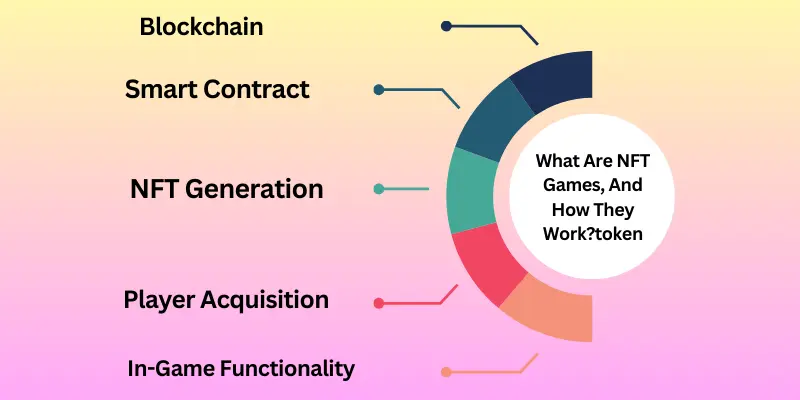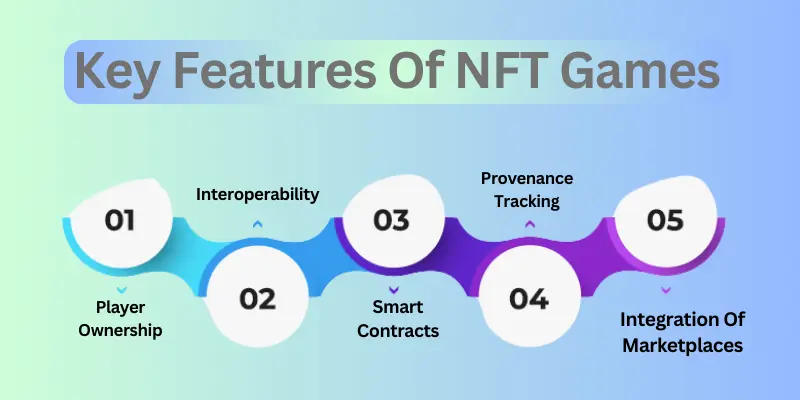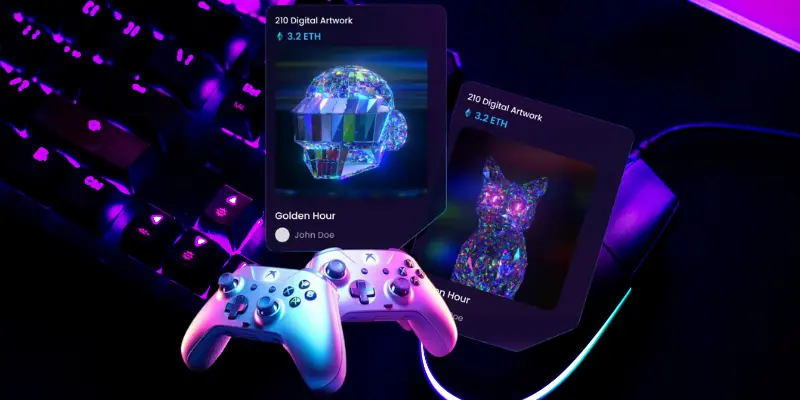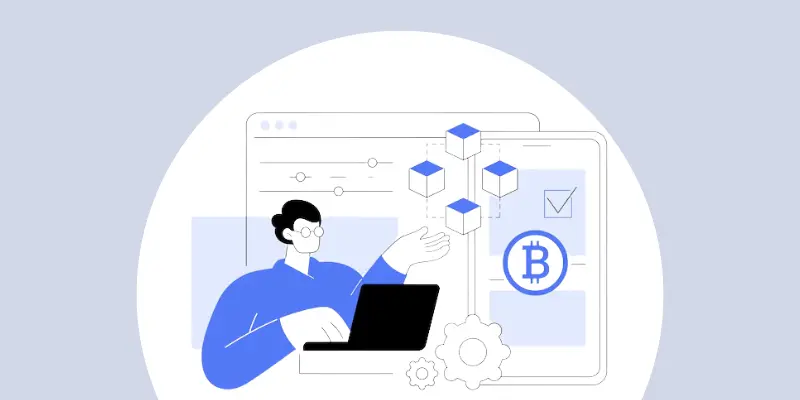NFTs will revolutionize the gaming industry by 2024. This new technology blends traditional gaming and blockchain technology, creating the most exciting gaming experience. Players have complete ownership over the game's assets and can participate innovatively, and developers are exploring new ways to earn money. NFTs are unique digital assets that transform in-game assets into tangible assets that can be traced back to the owner and accelerate the growth of NFT Game Development.
NFTs serve as digital certificates of ownership tied to blockchain. In games, they could symbolize anything from distinctive characters and powerful equipment to upgrades for cosmetics or real property. The blockchain-enabled ownership system has several advantages. Creating an NFT game requires careful preparation. Whether you are an experienced game developer or a blockchain gaming beginner, this manual will equip you with crucial information and the most effective techniques. Explore the constantly changing digital landscape and begin your NFT game development.
What Are NFT Games, And How They Work?token

NFT games incorporate non-fungible tokens in their primary gameplay mechanics. They utilize blockchain technology to give gamers the ability to verify ownership over objects they purchase or acquire in the game. The items they buy are represented by NFTs and digital certificates blockchain, unlike typical in-game items controlled by the company that controls the game. NFTs allow players to have full ownership over their digital assets.
You know that NFT games allow you to own and trade virtual goods. This is great; however, how do they work? We need to understand how NFTs drive these games.
Blockchain
NFT games are based on decentralized blockchains like Ethereum and Solana. Blockchains are unchangeable ledgers that securely record transactions and control all the in-game NFT assets.
Smart Contract
Self-executing parts of software embedded in the blockchain regulate the functionality and logic of NFTs inside the game. Smart contracts specify how in-game assets are purchased, traded, and altered.
NFT Generation
Game developers issue NFTs representing unique game assets, including weapons, characters, virtual terrain, and other items. The smart contract encodes the regulations governing their rarity, characteristics, and functionality in the NFT.
Player Acquisition
The players have several options to earn their hands NFTs through these games. You can earn them via gameplay. Many games feature in-game marketplaces, where gamers can purchase NFTs directly by contacting the Hire Game Developers using an in-game currency or cryptocurrency.
In-Game Functionality
The game's concept and the smart contract associated with every NFT will determine the exact uses for NFTs. These could include playable characters, fancy improvements to the appearance, plots of land that you can control, or even instruments that offer you an advantage when you play.
Also Read: NFT Marketplace Development: Everything You Need to Know About
Key Features Of NFT Games

Knowing the fundamental aspects of NFT games will allow you to generate additional revenue streams. You can also establish strong communities that support your game and adopt the latest technology to benefit both the players and you. Explore the strategic possibilities.
Player Ownership
NFT games are fundamentally changing the relationships between players and developers. Players control their earnings using blockchain to transform game-related products into distinct, tradeable tokens. The process opens up new opportunities for earning money, as players recognize that there is value in purchasing items they can later trade on the marketplace. In addition, it creates an understanding of the community's ownership and makes players more involved in the game's long-term success.
Interoperability
The ability for NFT assets to function across various games is in the process of being developed, but the potential upsides are immense! The gear or collectibles you've earned from your game may be valuable beyond the game; you may also draw players from other initiatives. This opens up the possibility of collaboration and licensing the assets you use in your game and also increases the appeal of your game to avid gamers.
Smart Contracts
At the heart, the premise of NFTs is that they are self-executing agreements stored in a blockchain. This allows for more efficient and low-cost transactions without continuous oversight. This also allows Remote Developers For Hire to explore innovative in-game economics and intricate reward systems. Even royalty structures will enable players to receive some of the revenue from the future trading of their games.
Provenance Tracking
NFT games prioritize transparency. Every item has a public, accessible record of ownership and associated transactions. This improves the trust of dedicated collectors while also preventing fraud and improving the market value of the rare collectibles found in games. A reputable marketplace will benefit the players and their reputation over the long term.
Integration Of Marketplaces
NFT marketplaces provide a substantial source of revenue that extends beyond initial sales. They're social hubs, attracting gamers even when they're not playing. By taking a percentage of the transactions or providing top-quality features for marketplaces, they provide a steady source of revenue. In addition, by decentralizing the part of the game's economy, it is possible to reduce the maintenance necessary to run traditional retail stores.
How To Develop a NFT Game
When implemented with the correct strategies, NFT integration can revolutionize game economies, improve player ownership, and create vibrant communities. If you're looking to take advantage of this fast-changing landscape, understanding the essential elements of a successful NFT game and the time and Cost To Build An NFT Game is necessary.
Define Your Game Concept
The first step is to sketch out your game's fundamental aspects carefully. Then, choose the type of game (such as a battle of cards and role-playing or open-world exploration) that best fits the game you envision. Decide on players' most important actions and how they'll advance within the game world. The most important thing to consider is how NFTs improve overall gaming enjoyment.
Select Your Blockchain Platform
The blockchain you use is a significant factor in development and user experience. Some of the most well-known options include Ethereum, which is famous for its extensive Unity Game Developers community. However, it could also incur more significant fees. Polygon is a scaling platform based on Ethereum that allows faster and less expensive transactions. Take your time researching each choice to make a well-informed decision.
Assemble Your Development Toolkit
Pick the best equipment to create your game. Choose a game engine that offers all the capabilities and versatility you want. To use blockchain technology, you must learn the language of smart contracts on the chosen platform. You can also include a safe wallet and select the most compatible NFT marketplaces. You should choose suitable web development tools if your game has an online component.
NFT Design And Smart Contract Development
To create visually attractive NFTs, consider their assigned characteristics, including the right rarity levels. In parallel, you should create robust smart contracts to regulate the rules regarding NFT functions, ownership, trading, and how they're used to play your game.
Construct The Core Game Experience
It's where your game design abilities are at their best. Develop a simple, engaging user interface with stunning graphics and fluid gameplay mechanics. While you're at it, build the infrastructure for safe data storage, NFT management, communications via blockchain, and user account creation.
Seamless NFT Integration
Make sure that NFTs are seamlessly included in your game. Determine how NFTs are created (minted) through the blockchain. Establish clear paths for players to acquire NFTs via game-based quests, purchases directly, or any other means. Create how NFTs are utilized in your game's main elements and gameplay. Finally, create a system to enable safe and secure NFT trading.
Testing And Security
Initially, running thorough tests of your game and the performance of the NFTs you use is crucial. In addition, it's strongly recommended that you conduct professional audits of smart contracts to find and address any security flaws.
Launch And Ongoing Support
Make sure your game is a hit through a planned pre-launch advertising strategy and ongoing community involvement. After launch, it's crucial to maintain support with frequent updates, regular expansion of content or balance adjustments, and prompt player support to ensure the long-term viability of your game.
Proven Strategies For Successful NFT Game Development 2024
Actual ownership of game objects, such as NFT games, gives players numerous ways to connect, earn money, and develop an atmosphere of belonging. The process of NFT game development requires thorough preparation and execution. This section outlines top proven strategies that can assist you in achieving success with NFT game production. We're here to help you achieve your NFT goal of developing games by being a leading NFT game development business aware of the intricacies of this constantly evolving industry.
Create a Unique And Engaging Gameplay Experience
A captivating experience for players is the first step towards making a memorable NFT game. Create the most enjoyable and appropriate idea for a game. Consider the elements that make games entertaining, such as the challenges, visuals, stories, and prizes. Your goal? Create Compelling Gaming that lets players experience an atmosphere they will never want to quit. As a leading NFT game design firm, we can help you realize your idea and ensure that your game stands out from other games.
Foster a Strong Community Around Your Game
Nurture the development of a vibrant community for your NFT game via social media, forums, and events. Let players share their thoughts and feedback, creating an atmosphere of community and a sense of ownership. An active community improves player retention and helps spread the word about your sport, which can result in long-term growth.
Integrate NFTs seamlessly In Gameplay Mechanics
Let players be empowered to purchase in-game items and make NFTs the central feature in your gameplay. Develop game mechanics that let players buy, sell, and acquire digital assets and seamlessly integrate NFTs. It increases players' engagement level and provides innovative and exciting ways to earn money from the game they play. We will assist you in designing a game to entice players and help propel them to success in the competitive gaming market since we're an established NFT gaming development company. We understand the importance of NFT integration.
Leverage Blockchain Technology For Security And Transparency
Use blockchain technology during your NFT game to ensure you can conduct the security of your transactions and make them transparent. Blockchain is a secure base that safeguards assets from scarcity as well as the rights of ownership. Choose a reliable platform compatible with your game's demands to ensure users' satisfaction and the ability to scale. The gaming experience for players and the performance of your games will benefit from blockchain since it helps players feel confident regarding the security of their game assets.
Implement a Robust Monetization Strategy
Create a plan to help you make money from your NFT game. This will ensure customer satisfaction and the project's sustainability. Consider different strategies, such as purchasing in-game or selling NFTs, subscription models, and virtual economies. This approach balances revenue production and player incentive, thus maximizing your game's earnings potential and keeping your players happy. The result is that you make money while giving gamers a fun playing experience.
Trends In The Future Of NFT Games
Also Read: NFT Marketplace Development: The Future of Digital Ownership For 2024
The gaming world is advancing rapidly, and the development of NFT gaming has the potential to alter the gaming landscape further. In the wake of Web 3.0, the gaming sector is poised for greater growth and change. NFTs can play a crucial part in the new world of gaming. They will surely be a significant influence on the direction of the gaming industry.
Play-To-Earn Games
The "play to earn" game business model has been growing in recognition to expand the number of players playing video games. Through this method, the players can receive rewards when they play the game. These rewards could be used to buy game-specific items or to trade with players. It's not just the players who have a reason to continue playing; it also allows them to recoup some of the costs. Additionally, play-for-money games typically utilize blockchain technology, making it a more secure and transparent way of rewarding players. This business model can alter the nature of video gaming.
Blockchain-Based Gaming Using NFT
As we have mentioned previously, Blockchain technology and NFTs are hot subjects worth exploring in the world of gaming. Furthermore, what lies ahead for NFT games is based on Blockchain technology. Blockchain-based NFT gaming allows players to control the platform's assets to generate more views.
Blockchain games are born out of the growing features and capabilities they offer players. The coming NFT games are expected to be part of the core Blockchain technology. The future of NFT games allows players to sell in-game assets in the game they love. They can make transactions using the game's in-game currency on another market and earn money off of this.
Metagame
Metaverses are digital realms with various tools and elements, such as communications, financial games, personal profiles, etc. This promise is due to the possibilities it provides anyone within the metaverse to build or purchase. They can then look at NFTs to create virtual estates, participate in online communities, develop virtual identities, and even play in other ways.
The variety of apps offers various ways to earn money in digital and real-world wallets. Users and businesses can integrate into metaverse frameworks. NFT Gaming Metaverse is awe-inspiring and could be a future. Future NFT games will use Metaverse cryptocurrency games to provide an enjoyable gaming experience. If a game were similar to the NFT fight game, it would seem surreal, and it has a variety of possibilities on the NFT market that can generate real-world earnings.
Investment And Credibility
The NFT and the decentralized finance industry are beginning to work together in many fascinating ways. There are apps for DeFi that permit you to take out loans using collateral. The lender gets paid. In the event that the borrower is unable to pay the DAI, the collateral will be given back to the lending institution. However, only some have the required currency to participate in any game. Mobile App Development Company For Game Development can choose to sell shares of their NFT. This allows fans and investors to purchase a portion of the NFT without buying the whole thing.
The possibilities are expanded for collectors as well as minters. Not only the DEXs NFT marketplace but also fractionalized NFTs may be traded. That means there'll be many more sellers and buyers. The value of the fractions in an NFT could be used to determine its value. There is a greater chance of holding and earning from your passions. It's harder to be exempted from recognizing NFTs in the present.
NFT Agriculture
Some games based on NFT let players farm exotic NFTs using tokens. For instance, users who gamble their tokens are awarded unique cards, sets, or chests. Their uniqueness is categorized into two categories: visual rareness and gameplay.
NFTs can include things like background material, card frames, and more if they are farmed visually. In contrast, it is possible to use a gameplay rarity NFT product that appears to be an instrument that could offer players an advantage against their rivals.
Microtransactions
Microtransactions have recently become one of the most widely used gaming innovations. Instead of purchasing one game and having it for the whole time, players can now buy it (or obtain it free) and purchase a fee for game-related features.
Gaming And Social Media Meet
Games on Near are also working as hybrid platforms for social media. With Near Lands, a pixelated open-world, land-based match, gamers can participate in as much of an experience of belonging as they can for the game itself. As they explore the game's open world, building NFT objects and characters is possible. Reality Chain also explores this idea through its multi-chain social gaming metaverse, which was recently released through the Octopus Network. Reality Chain lets players enhance their gaming and social lives with immersive games and 3D and 2D multiplayer experiences.
Final Thoughts
NFT games represent the future of gaming and have gained massive acceptance in many nations. What lies ahead for NFT games looks pretty bright due to the benefits they can provide. Tools and resources are readily available, and the market is awash with innovative gaming games. Whether you're a well-established company or an independent developer with a novel idea, the NFT gaming scene is full of exciting possibilities.
Ultimately, making a successful NFT game combines creativity, imagination, and a meticulous plan. Game developers could realize the game's full possibilities through engaging games, using blockchain technology, seamlessly connecting NFTs, developing a vibrant community, and creating a solid strategy for monetization. We are a leading NFT Game Development Company, and we know how crucial this strategy is to succeed in the competitive world. Let us work with you to help you achieve your NFT game goals and success within your NFT game development business.













Share this blog